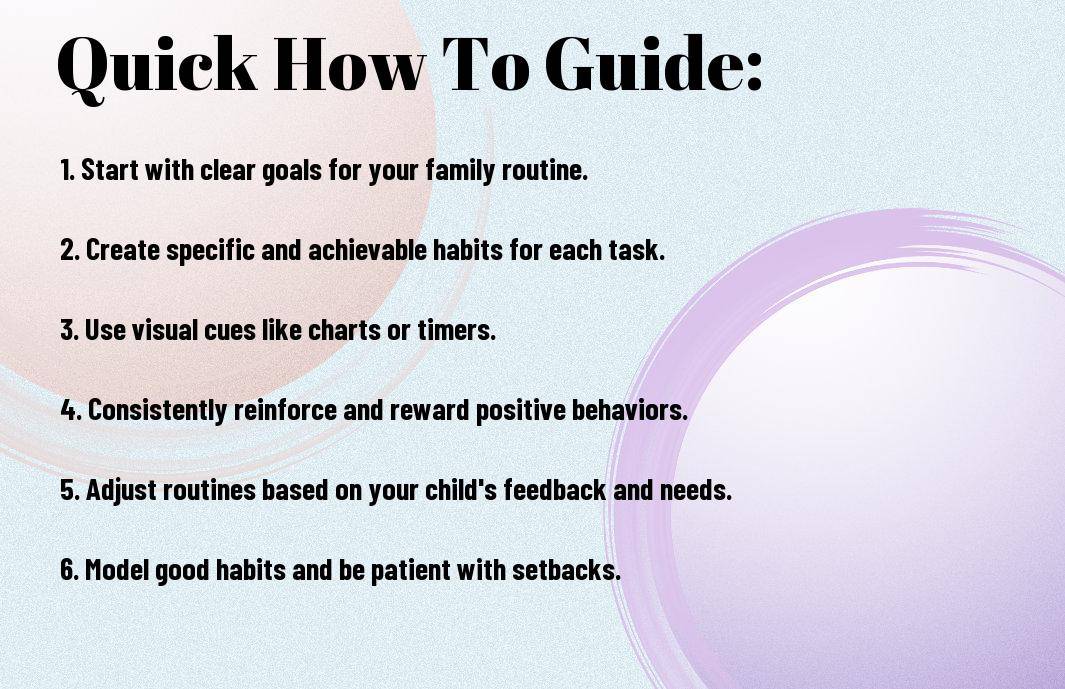Children thrive on routine and habits, making it crucial for parents to establish solid foundations early on. In this guide, we will explore the power of Atomic Habits in helping parents build effective routines with their little ones. By incorporating small, consistent changes into daily life, parents can create a harmonious environment that fosters growth and development. For an in-depth look at teaching Atomic Habits to kids and teens, check out Teaching ‘Atomic Habits’ to Kids and Teens – Erfan Zarafshan.
Strategic habit formation lays the foundation for a lifetime of success
Raising children in today’s fast-paced world requires more than love and good intentions; it demands strategic habit formation that lays the foundation for a lifetime of success. “Atomic Habits for Parents – Building Routines with Children” is your comprehensive guide to transforming your family life through the power of small, consistent changes. Discover the secrets to creating a nurturing and productive environment for your little ones, where every day brings a new opportunity for growth and development. From modeling healthy habits to making routines fun, this guide provides actionable strategies for parents at every stage. Whether you’re dealing with toddlers or teenagers, learn how to make consistency, involvement, and flexibility your greatest allies in parenting. Dive deep into the science of habits and uncover why tiny adjustments in your daily interactions can lead to profound outcomes for your children’s future. Join us on this journey to master the art of parenting with atomic habits, and watch as your efforts today turn into your child’s success tomorrow.
Key Takeaways:
- Model Healthy Habits: Children learn by observing, so parents should demonstrate positive habits like organization, punctuality, and self-care.
- Start Small: Building routines with children can be overwhelming, start with small, manageable habits and gradually increase complexity.
- Consistency is Key: Stick to a routine to help children feel secure and develop good habits that will benefit them in the long run.
- Make it Fun: Incorporate games, challenges, or rewards to make routines enjoyable for children.
- Involve Children: Encourage children to participate in creating routines, this gives them a sense of ownership and responsibility.
- Be Flexible: Understand that life with children can be unpredictable, be willing to adapt routines when necessary.
- Celebrate Progress: Acknowledge and celebrate achievements to motivate children to continue building positive habits.


Understanding Atomic Habits
One of the keys to creating lasting change in our lives lies in understanding atomic habits. These are small, incremental changes that we make on a daily basis that lead to significant improvements over time. By focusing on these tiny adjustments, we can transform our routines and behaviors in profound ways.
The Science Behind Atomic Habits
Assuming you have ever wondered how habits are formed, the science behind atomic habits offers some intriguing insights. Habits are imperatively behaviors that have been automated through repetition and reinforcement in our brain. When we consistently perform a specific action in a particular context, neural pathways are strengthened, making it easier for us to repeat that behavior in the future.
Why Small Changes Make a Big Difference
You may be wondering why small changes can have such a profound impact on our lives. The truth is that our daily habits shape the person we become in the long run. By making small, consistent adjustments to our routines, we can gradually steer our lives in a positive direction, leading to significant improvements in our health, relationships, and overall well-being.
To underscore this point, consider the concept of compound interest. Just as saving a small amount of money regularly can lead to substantial wealth over time, making small changes to our habits can compound into remarkable transformations in the future.
Laying the Foundation
Many parents understand the value of establishing healthy routines within the family unit. These routines not only provide structure and stability for children but also help parents manage daily tasks efficiently. However, building solid habits requires laying a strong foundation for success.
Identifying Your Family’s Values and Goals
Family’s values and goals are important when creating routines that work for everyone. Sit down with your family members and discuss what matters most to each of you. This could include themes like health, education, quality time together, or personal development. Once you have identified these values and goals, you can align your habits and routines to support them. For instance, if family health is a priority, you can establish habits around meal planning, regular exercise, and sufficient sleep.
Creating a Supportive Environment for Habit Formation
Your physical environment plays a crucial role in shaping your habits. Make sure your home is conducive to the habits you are trying to build. For example, if you want to encourage reading as a nightly routine, create a cozy reading nook with books easily accessible. Additionally, eliminate distractions that might hinder habit formation, such as having the TV on during study time. By creating a supportive environment, you set yourself and your children up for success in establishing and maintaining positive habits.
Habit-Forming Techniques for Parents
Once again, welcome back to our discussion on building routines with children. In this chapter, we will explore some powerful habit-forming techniques that parents can use to create a positive environment for their children.
Mastering the Art of Cue-Routine-Reward
Even before your child understands the concept of habits, you can start incorporating the cue-routine-reward system into their daily routine. This involves identifying a cue (such as a specific time of day or an action), creating a routine (the habit you want to establish), and offering a reward (could be a small treat or words of praise) once the routine is completed. This system helps reinforce the habit loop and make it more likely to stick.
The Power of Consistency and Small Wins
Now, let’s talk about the importance of consistency and celebrating small wins when it comes to building habits with your children. Consistency is key when it comes to forming habits, as regular practice helps solidify the behavior. Additionally, acknowledging and celebrating small wins along the way can motivate your child to continue with the habit. Whether it’s completing a task without reminders or showing improvement, recognizing their efforts can boost their self-esteem and make them more likely to stick with the routine.
Mastering the art of consistency and acknowledging small wins can lead to long-lasting habits that benefit both you and your child. The key is to make the process fun and rewarding, so that your child is enthusiastic about sticking to the routine. Note, habits take time to form, so be patient and celebrate every step towards success!
Age-Appropriate Habits for Different Stages
Tips for Establishing Routines with Toddlers
Your toddler is at a stage where routines can bring a sense of security and stability to their day. To establish a routine, focus on simple activities like brushing teeth, reading a book before bedtime, and tidying up toys after playtime. Consistency is key, so try to stick to the same schedule every day.
- Use visual cues like charts or stickers to help your toddler understand the routine.
- Offer praise and encouragement when they successfully follow the routine.
- Be patient and allow room for flexibility as your toddler adapts to the new habits.
After a while, these routines will become ingrained, and your toddler will start to follow them with less resistance.
Building Independence with School-Aged Children
On your child’s journey to becoming more independent, establishing routines can help them develop a sense of responsibility and autonomy. At this stage, involve your school-aged child in setting their own routines. Encourage them to take charge of tasks like preparing their school bag, making their bed, and organizing their study materials.
Age-appropriate chores and responsibilities can instill a sense of pride and accomplishment in your child, fostering their independence and self-reliance.
Guiding Teens Toward Self-Discipline
Age-appropriate habits for teens should focus on nurturing self-discipline and time-management skills. Encourage your teen to create a study schedule, prioritize their tasks, and limit screen time to ensure a balance between schoolwork and relaxation.
To help your teen develop self-discipline, lead by example and provide guidance rather than control. Open communication and understanding are key in guiding them towards responsible habits and decisions.
Customizing Routines for Your Child
Keep in mind that building routines with your children using the Atomic Habits method can have a significant impact on their development and behavior. If you’re looking for more guidance on how to apply the Atomic Habits method to your parenting, check out this helpful resource on How To Apply The Atomic Habits Method To Your Parenting.
Accounting for Individual Personalities and Learning Styles
While establishing routines is important, it’s crucial to remember that each child is unique. The same routine may not work for every child, so it’s important to consider your child’s individual personality and learning style when customizing their habits. Some children thrive with visual aids and charts, while others may respond better to verbal reminders or physical cues. By tailoring the routine to suit your child’s preferences, you can make the habit-building process more effective and enjoyable for them.
Adjust and Adapt: The Flexible Approach to Parenting
There’s no one-size-fits-all solution when it comes to parenting, and the same goes for establishing routines with your children. Your family’s needs and dynamics may change over time, so it’s important to be adaptable and flexible with your approach. Adjusting the routines as your child grows and adapting to new circumstances will help you sustain the habits and create a positive environment for your child’s growth and development.
Overcoming Challenges Together
All parents face challenges when trying to establish new habits with their children. It’s important to remember that it’s a journey that takes time and patience. Building routines with your children is a team effort, and overcoming obstacles together will strengthen your bond and create a positive environment for growth and development.
Navigating Common Roadblocks in Habit Formation
For most parents, the biggest roadblock in habit formation is inconsistency. Children thrive on routine, so it’s crucial to establish a consistent schedule and stick to it as closely as possible. Another common roadblock is resistance from children, who may be reluctant to adopt new habits. Communication and positive reinforcement are key strategies to overcome this challenge and encourage participation.
Strategies for Maintaining Motivation and Engagement
Formation of new habits can be challenging, but with the right strategies, you can maintain motivation and engagement. Setting achievable goals and celebrating small wins can help keep you and your children motivated. Creating a fun and interactive environment around habit-building activities can also keep children engaged and excited about their progress.
With consistency, communication, and a positive mindset, you can overcome challenges and help your children develop healthy habits that will benefit them for a lifetime.
Integration into Family Life
Not every new routine can be successfully incorporated into family life without some adjustments and involvement from all members. It’s important to make the effort to integrate these new habits seamlessly into your daily routines so that they become a natural part of your family’s lifestyle.
How to Involve the Whole Family in New Routines
Integration starts with getting everyone on board and encouraging active participation. This can be achieved by explaining the benefits of the new routine, setting clear expectations, and involving each family member in the planning process. Assigning age-appropriate tasks and responsibilities can help children feel included and invested in the success of the new routine.
Celebrating Progress and Recognizing Achievements
Into the process of building new habits, celebrating progress and recognizing achievements play a crucial role in motivating and inspiring the whole family to continue their efforts. Whether it’s a small milestone like consistently following the routine for a week or a larger achievement like mastering a new skill, taking the time to acknowledge and celebrate these moments can boost morale and strengthen family bonds.
Another important aspect of celebrating progress is to avoid comparing your family’s journey to others. Every family is unique, and progress should be measured based on your own circumstances and goals. By focusing on the positive changes and growth within your own family, you can instill a sense of pride and accomplishment that will encourage everyone to keep moving forward.
Final Words
So if you’re a parent looking to build strong routines with your children, consider applying the principles outlined in Atomic Habits: Tiny Changes, Remarkable Results by James Clear. By focusing on small, consistent actions and creating a supportive environment, you can cultivate positive habits that will benefit your family for years to come. Remember that building routines takes time and patience, but the effort is well worth the long-term rewards.
FAQ
Q: Why is it important for parents to build routines with children?
A: Establishing routines with children creates a sense of stability, security, and predictability, which can help them feel safe and thrive.
Q: How can parents use atomic habits to build routines with children?
A: Parents can break down routines into small, manageable steps and create positive habits that, when repeated consistently, can lead to long-term success.
Q: What are some examples of atomic habits that parents can implement with their children?
A: Examples include setting a designated homework time each day, practicing gratitude before bedtime, or having a family meal together without distractions.
Q: How can parents make routines fun and engaging for children?
A: Incorporating games, challenges, or rewards can make routines more enjoyable for children and encourage their participation.
Q: How can parents adapt routines as children grow and change?
A: Parents can be flexible and adjust routines to meet the evolving needs and interests of their children while still providing structure and consistency.
Q: What are the benefits of involving children in creating their own routines?
A: Involving children in the process can empower them, promote independence, and help them take ownership of their habits and responsibilities.
Q: How can parents stay motivated and consistent in building routines with children?
A: Setting realistic goals, tracking progress, and celebrating small wins can help parents stay motivated and maintain consistency in establishing routines with children.
Expand Your Ideas
Atomic Habits for improving mental health and wellbeing



